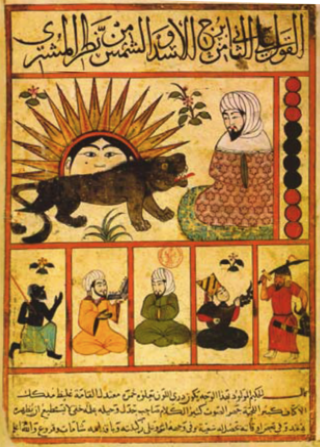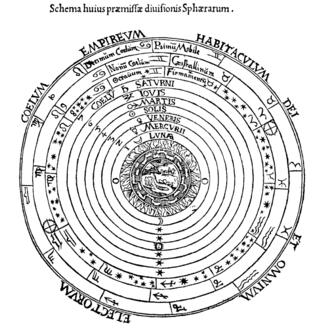Related Research Articles

Claudius Ptolemy was a Roman mathematician, astronomer, astrologer, geographer, and music theorist, who wrote about a dozen scientific treatises, three of which were of importance to later Byzantine, Islamic, and Western European science. The first is the astronomical treatise now known as the Almagest, although it was originally entitled the Mathēmatikē Syntaxis or Mathematical Treatise, and later known as The Greatest Treatise. The second is the Geography, which is a thorough discussion on maps and the geographic knowledge of the Greco-Roman world. The third is the astrological treatise in which he attempted to adapt horoscopic astrology to the Aristotelian natural philosophy of his day. This is sometimes known as the Apotelesmatika but more commonly known as the Tetrábiblos, from the Koine Greek meaning "Four Books", or by its Latin equivalent Quadripartite.

Abraham ben Meir Ibn Ezra was one of the most distinguished Jewish biblical commentators and philosophers of the Middle Ages. He was born in Tudela, Taifa of Zaragoza and present-day Navarre.

William Lilly was a seventeenth century English astrologer. He is described as having been a genius at something "that modern mainstream opinion has since decided cannot be done at all" having developed his stature as the most important astrologer in England through his social and political connections as well as going on to have an indelible impact on the future course of Western astrological tradition.

Joachim Camerarius, the Elder, was a German classical scholar.
Abraham bar Ḥiyya ha-Nasi, also known as Abraham Savasorda, Abraham Albargeloni, and Abraham Judaeus, was a Catalan Jewish mathematician, astronomer and philosopher who resided in Barcelona.

Mundane astrology, also known as political astrology, is the branch of astrology dealing with politics, the government, and the laws governing a particular nation, state, or city. The name derives name from the Latin term mundus, 'world'.

Abu Ma'shar al-Balkhi, Latinized as Albumasar, was an early Persian Muslim astrologer, thought to be the greatest astrologer of the Abbasid court in Baghdad. While he was not a major innovator, his practical manuals for training astrologers profoundly influenced Muslim intellectual history and, through translations, that of western Europe and Byzantium.
Abu Ja'far Ahmad ibn Yusuf ibn Ibrahim ibn Tammam al-Siddiq Al-Baghdadi, known in the West by his Latinized name Hametus, was a Muslim Arab mathematician, like his father Yusuf ibn Ibrahim.

Astrology has used the concept of classical elements from antiquity up until the present. In Western astrology and Sidereal astrology four elements are used: Fire, Earth, Air, and Water.

Essential dignity, in the context of an astrological horoscope or natal chart, refers to the relative “strength” or “weakness” of a planet based on its zodiac sign and specific degree. This strength or weakness is referred to as the planet’s essence—what the 17th-century astrologer William Lilly called "the strength, fortitude or debility of the Planets [or] significators."
Abū’l-‘Abbās al-Faḍl ibn Ḥātim al-Nairīzī was a Persian mathematician and astronomer from Nayriz, now in Fars Province, Iran.

Plato Tiburtinus was a 12th-century Italian mathematician, astronomer and translator who lived in Barcelona from 1116 to 1138. He is best known for translating Hebrew and Arabic documents into Latin, and was apparently the first to translate information on the astrolabe from Arabic.
In astrology, a decan is the subdivision of a sign. In order to give fuller interpretation to the zodiac signs, ancient astrologers subdivided each sign into periods of approximately ten days. These divisions are known as the "decans" or "decantes" and cover modifications of individual traits, attributed to minor planetary influences, which temper or blend with the ruling influence of the period. The ten-day spans are somewhat arbitrary in order to allow for the five extra days in the year beyond the 360 days required for the thirty-six decans.

Tetrabiblos (Τετράβιβλος) 'four books', also known in Greek as Apotelesmatiká (Ἀποτελεσματικά) "Effects", and in Latin as Quadripartitum "Four Parts", is a text on the philosophy and practice of astrology, written in the 2nd century AD by the Alexandrian scholar Claudius Ptolemy.
Antiochus of Athens was an influential Hellenistic astrologer who flourished sometime between the late 1st and mid 2nd century AD. There is some disagreement as to when he lived and wrote. Franz Cumont and others have argued that he lived as early as the 1st century BC, while David Pingree placed him as late as the end of the 2nd century AD. The one agreed datum is that Antiochus is referenced by Porphyry, and so Antiochus must have lived before the death of Porphyry.

The Toledo School of Translators is the group of scholars who worked together in the city of Toledo during the 12th and 13th centuries, to translate many of the Judeo-Islamic philosophies and scientific works from Classical Arabic into Latin.

In astrology, certain stars are considered significant. Historically, all of the various heavenly bodies considered by astrologers were considered "stars", whether they were stars, planets, other stellar phenomena like novas and supernovas, or other solar system phenomena like comets and meteors.

Abu'l Hassan Ali ibn Ridwan Al-Misri was an Arab of Egyptian origin who was a physician, astrologer and astronomer, born in Giza.
Kalonymus ben Kalonymus ben Meir, also romanized as Qalonymos ben Qalonymos or Calonym ben Calonym, also known as Maestro Calo was a Jewish philosopher and translator from Hachmei Provence. Kalonymus studied philosophy and rabbinical literature at Salon-de-Provence under the direction of Abba Mari ben Eligdor and Moses ben Solomon of Beaucaire. Kalonymus also studied medicine, although Kalonymus never seemed to have practiced it.
Yaḥyā ibn al-Biṭrīq was a Assyrian scholar who pioneered the translation of ancient Greek texts into Arabic, a major early figure in the Graeco-Arabic translation movement under the Abbasid empire. He translated for Al-Ma'mun the major medical works of Galen and Hippocrates, and also translated Ptolemy's Tetrabiblos.
References
- 1 2 3 Shlomo Sela (2003), Abraham ibn Ezra and the rise of medieval Hebrew science. Brill. ISBN 90-04-12973-1, p. 321
- ↑ John Frawley (2000), Electional Astrology, in The Real Astrology. London: Apprentice Books. ISBN 0-9539774-0-4. Footnote 2, page 109. Cited by Deborah Houlding (2006).
- ↑ H. Darrel Rutkin (2006), Astrology, in Roy Porter et al. (eds.), The Cambridge History of Science: Early modern science. Cambridge University Press. ISBN 0-521-57244-4, p. 546
- ↑ Anthony Grafton (1999), Cardano's cosmos: the worlds and works of a Renaissance astrologer, Harvard University Press. ISBN 0-674-09555-3, p. 137.
- ↑ See, for example, Deborah Houlding, Ptolemy's Centiloquium; or S. Jim Tester (1987), A history of western astrology, Boydell & Brewer. ISBN 0-85115-446-8, pp. 154–5
- ↑ Deborah Houlding (2006), Centiloquium of Hermes Trismegistus, skyscript.co.uk; with a translation by Henry Coley (1676).
David Juste and Charles Burnett, Warburg Institute Bibliotheca Astrologia Latina. Accessed 20 June 2011. - ↑ Deborah Houlding, Bethem's Centiloquium, skyscript.co.uk; with a translation by Henry Coley (1676).
David Juste and Charles Burnett, Warburg Institute Bibliotheca Astrologia Latina. Accessed 20 June 2011.